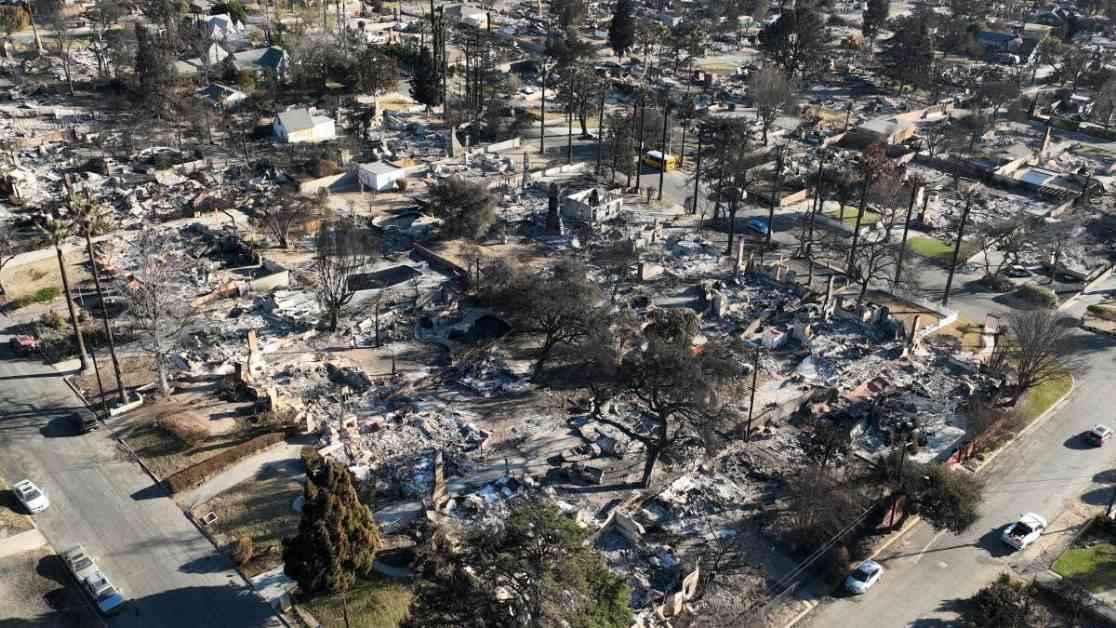The recent wildfires in Los Angeles have not only left a trail of destruction in their wake but have also significantly impacted the economic landscape of the region. The financial toll of the fires has been staggering, with estimates surpassing $250 billion, making it one of the costliest natural disasters in U.S. history. The fires have not only claimed thousands of homes and businesses but have also disrupted major industries across Southern California, leading to a decline in the county’s gross domestic product by an estimated $4.6 billion this year, according to a recent study by UCLA Anderson Forecast.
Winners and Losers in the Aftermath of the Wildfires
As with any natural disaster, there are bound to be both winners and losers. While some businesses may benefit from the long road to recovery ahead, others have suffered irreparable damage. Construction workers and contractors, environmental and building cleanup firms, real estate agents, and retailers selling household goods and hardware are among the sectors that stand to gain from the rebuilding efforts.
On the flip side, businesses that were destroyed or damaged by the fires, as well as industries that could suffer from displaced workers and a drop in demand, such as tourism and Hollywood production, are facing significant challenges. According to Adam Rose, senior research fellow at USC’s Center for Risk and Economic Analysis of Threats and Emergencies, most disasters have an uneven effect across groups and society, creating a complex web of winners and losers.
The Rebuilding Effort: A Massive Construction Boom
The wildfires, which ravaged an estimated 16,000 homes, businesses, and other structures, are expected to kick off a massive construction boom in Los Angeles. The speed and scale of the rebuilding efforts will depend on how city officials facilitate the process and address regulatory obstacles that may impede progress, according to economist Christopher Thornberg of Beacon Economics.
While the new building code implemented in 2008 was a significant step forward in requiring fire-resistant materials in high-risk areas, there are ongoing debates about whether stricter construction guidelines should be considered in the wake of the recent fires. However, rebuilding efforts are already underway, with Governor Gavin Newsom and Los Angeles Mayor Karen Bass issuing executive orders to expedite the process.
The estimated cost of rebuilding each residential property is around $1 million, with architects, contractors, and other construction professionals expected to profit from the surge in demand. The rebuilding efforts will not only create job opportunities but also drive the demand for materials like steel, wood, concrete, and glass. The incorporation of modern fire prevention measures into the rebuilding plans is also expected to enhance the resilience of communities and reduce the risk of future catastrophes.
Small Businesses: A Personal Story of Loss and Resilience
The wildfires have had a devastating impact on the region’s retail sector, with hundreds of small businesses facing dire disruptions. From charred plazas and blocks of small businesses to beloved local establishments, the fires have left a trail of destruction that is deeply personal for many business owners. The resilience of these small businesses is being put to the test, as they grapple with questions of financial viability and the daunting task of starting over.
For Leo Bulgarini, the owner of an Altadena gelateria that narrowly escaped the fires, the future is uncertain. The outpouring of support from the community has been a source of solace, with customers sharing stories of how these small businesses have shaped their lives and communities. The loss of these establishments is not just a blow to the local economy but a loss of the human connection and sense of community that these businesses fostered.
Hollywood’s Economic Woes: A Double Blow
The fires have dealt a double blow to Hollywood, exacerbating an already tough economic climate for the industry. From the shutdown of movie theaters and productions due to COVID-19 to the writers and actors strikes in 2023, the industry has faced significant challenges in recent years. The destruction of homes and filming locations of Hollywood workers at all levels has further strained the industry, leading to temporary pauses in productions and disruptions in filming schedules.
The economic toll of the fires may lead to increased pressure on lawmakers to approve Governor Newsom’s proposed increase to the California film and TV tax incentive program. The hope is that this will help lure production back to the state and mitigate the financial impact of the fires on the industry. However, the uncertainty surrounding the industry’s recovery and the potential delays in production have cast a shadow over Hollywood’s future.
Tourism: Navigating a Fragile Industry
The fires have also taken a toll on the region’s tourism industry, which had just begun to recover from the pandemic’s impact. The images of devastation and destruction have detracted from the glamorous and beachy image that draws millions of visitors to the region each year. The drop in demand for hotel rooms in some areas has been offset by increased demand in fire-adjacent regions as displaced residents seek temporary housing.
Despite the challenges faced by the tourism industry, major conferences, award ceremonies, and conventions are proceeding as planned. However, local businesses are already feeling the effects of the disaster, with concerns about a shrinking labor force and a potential slowdown in employment growth in the region. The road to recovery for the tourism industry will require a concerted effort to rebuild consumer confidence and attract visitors back to the region.
In the aftermath of the wildfires, the resilience and determination of the Los Angeles community are on full display. As businesses and residents come together to rebuild and recover, the economic impact of the fires will continue to reverberate across the region. The road ahead may be challenging, but with perseverance and solidarity, Los Angeles will emerge stronger than ever.


